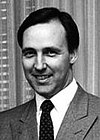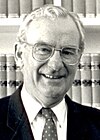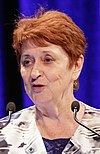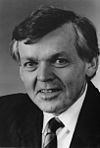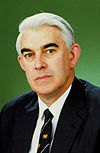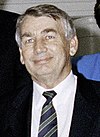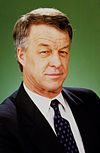
Robert James Lee Hawke was an Australian politician who served as the 23rd prime minister of Australia from 1983 to 1991, holding office as the leader of the Australian Labor Party (ALP). He was a member of parliament (MP) for the division of Wills from 1980 to 1992.

Simon Findlay Crean is an Australian politician and trade unionist. He was the Member of Parliament for Hotham from 1990 to 2013, representing the Labor Party, and served as a Cabinet Minister in the Hawke, Keating, Rudd and Gillard Governments. He was the Leader of the Labor Party and Leader of the Opposition from November 2001 to December 2003.
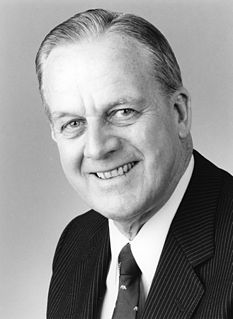
Lionel Frost Bowen, AC was an Australian politician and senior Labor Party figure, serving in the ministries of Gough Whitlam and Bob Hawke. He was Deputy Prime Minister of Australia from 1983 to 1990.
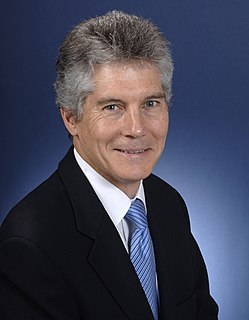
Stephen Francis Smith is a former Australian politician who was a member of the House of Representatives from 1993 to 2013. He served as a minister in the Rudd and Gillard Governments, including as Minister for Foreign Affairs (2007–2010), Minister for Trade (2010), and Minister for Defence (2010–2013).
The Fourth Fraser Ministry was the 53rd ministry of the Government of Australia. It was led by the country's 22nd Prime Minister, Malcolm Fraser. The Fourth Fraser Ministry succeeded the Third Fraser Ministry, which dissolved on 3 November 1980 following the federal election that took place in October. The ministry was replaced by the First Hawke Ministry on 11 March 1983 following the federal election that took place on 5 March which saw Labor defeat the Coalition.
The First Hawke Ministry (Labor) was the 54th ministry of the Government of Australia. It was led by the country's 23rd Prime Minister, Bob Hawke. The First Hawke Ministry succeeded the Fourth Fraser Ministry, which dissolved on 11 March 1983 following the federal election that took place on 5 March which saw Labor defeat Malcolm Fraser's Liberal–National Coalition. The ministry was replaced by the Second Hawke Ministry on 13 December 1984 following the 1984 federal election.
The Third Hawke Ministry (Labor) was the 56th ministry of the Government of Australia. It was led by the country's 23rd Prime Minister, Bob Hawke. The Third Hawke Ministry succeeded the Second Hawke Ministry, which dissolved on 24 July 1987 following the federal election that took place on 11 July. The ministry was replaced by the Fourth Hawke Ministry on 4 April 1990 following the 1990 federal election.
The Fourth Hawke Ministry (Labor) was the 57th ministry of the Government of Australia. It was led by the country's 23rd Prime Minister, Bob Hawke. The Fourth Hawke Ministry succeeded the Third Hawke Ministry, which dissolved on 4 April 1990 following the federal election that took place on 24 March. The ministry was replaced by the First Keating Ministry on 20 December 1991 following the resignation of Hawke as Prime Minister after a successful leadership challenge by Paul Keating.
The First Keating Ministry (Labor) was the 58th ministry of the Government of Australia. It was led by the country's 24th Prime Minister, Paul Keating. The First Keating Ministry succeeded the Fourth Hawke Ministry, which dissolved on 20 December 1991 following the successful leadership challenge by Keating and subsequent resignation of Bob Hawke as Prime Minister. The ministry was replaced by the Second Keating Ministry on 24 March 1993 following the 1993 federal election.

Susan Maree Ryan was an Australian politician and public servant. She was a member of the Australian Labor Party (ALP) and held ministerial office in the Hawke Government as Minister Assisting the Prime Minister for the Status of Women (1983–1988), Minister for Education and Youth Affairs (1983–1984), Minister for Education (1984–1987) and Special Minister of State (1987–1988). She was the first woman from the ALP to serve in cabinet and was notably involved in the creation of the Sex Discrimination Act 1984 and the Affirmative Action Act 1986. Ryan served as a senator for the Australian Capital Territory from 1975 to 1987. After leaving politics she served as the Age Discrimination Commissioner from 2011 to 2016, within the Australian Human Rights Commission.

The 1990 Australian federal election was held in Australia on 24 March 1990. All 148 seats in the House of Representatives and 40 seats in the 76-member Senate were up for election. The incumbent Australian Labor Party led by Bob Hawke defeated the opposition Liberal Party of Australia led by Andrew Peacock with coalition partner the National Party of Australia led by Charles Blunt despite losing the two-party-preferred vote. The election saw the reelection of a Hawke government, the fourth successive term.

The 1987 Australian federal election was held in Australia on 11 July 1987, following the granting of a double dissolution on 5 June by the Governor-General Sir Ninian Stephen. Consequently, all 148 seats in the House of Representatives as well as all 76 seats in the Senate were up for election. The incumbent Australian Labor Party, led by Prime Minister Bob Hawke, defeated the opposition Liberal Party of Australia, led by John Howard and the National Party of Australia led by Ian Sinclair. This was the first, and to date only, time the Labor Party won a third consecutive election.

The 1984 Australian federal election was held in Australia on 1 December 1984. All 148 seats in the House of Representatives and 46 of 76 seats in the Senate were up for election. The incumbent Labor Party led by Prime Minister Bob Hawke defeated the opposition Liberal–National coalition, led by Andrew Peacock.
Ross Vincent Free is a former Australian politician who served as a Labor member of the Australian House of Representatives representing the seat of Macquarie from 1980 until 1984, then Lindsay from 1984 until 1996. He served as a minister from 1990 until 1996 in both the Hawke and Keating ministries.

The Australian Minister for Communications, Urban Infrastructure, Cities and the Arts has overall responsibility for broadcasting, the information and communications technology industry, the information economy, and telecommunications within Australia. The portfolio is held by Paul Fletcher since May 2019.
David William Simmons, OAM, a former Australian politician, was a member of the Australian House of Representatives from 1983 to 1996, representing the seat of Calare for the Australian Labor Party. Simmons held several junior Ministerial positions in the Hawke and Keating Governments.

Christopher John Hurford was a Labor member of the Australian House of Representatives seat of Adelaide from 1969 to 1987. He played a key role in the development of Australia's skills-oriented immigration policy, and founded the ALP Labor Unity faction in SA.

The Hawke Government was the federal executive government of Australia led by Prime Minister Bob Hawke of the Australian Labor Party (ALP) from 1983 to 1991. The Government followed the Liberal-National Coalition Fraser Government and was succeeded by another Labor administration, the Keating Government, led by Paul Keating after an internal party leadership challenge in 1991. Keating served as Treasurer through much of Hawke's term as Prime Minister and the period is sometimes termed the Hawke-Keating Government.

The Keating Government was the federal executive government of Australia led by Prime Minister Paul Keating of the Australian Labor Party from 1991 to 1996. The Government followed on from the Hawke Government after Paul Keating replaced Bob Hawke as Labor leader in an internal party leadership challenge in 1991. Together, these two governments are often collectively described as the Hawke-Keating Government. The Keating Government was defeated in the 1996 federal election and was succeeded by the Howard Coalition government.
Labour government or Labor government may refer to:




